pub struct MenuButton { /* private fields */ }Expand description
Displays a popup when clicked.

This popup can be provided either as a Popover or as an abstract
GMenuModel.
The MenuButton widget can show either an icon (set with the
icon-name property) or a label (set with the
label property). If neither is explicitly set,
a Image is automatically created, using an arrow image oriented
according to direction or the generic
“open-menu-symbolic” icon if the direction is not set.
The positioning of the popup is determined by the
direction property of the menu button.
For menus, the halign and valign
properties of the menu are also taken into account. For example, when the
direction is ArrowType::Down and the horizontal alignment is Align::Start,
the menu will be positioned below the button, with the starting edge
(depending on the text direction) of the menu aligned with the starting
edge of the button. If there is not enough space below the button, the
menu is popped up above the button instead. If the alignment would move
part of the menu offscreen, it is “pushed in”.
| start | center | end | |
|---|---|---|---|
| down | 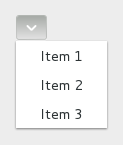 | 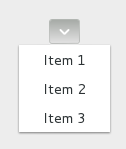 | 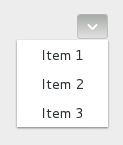 |
| up | 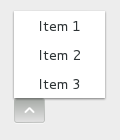 | 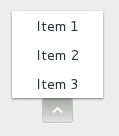 | 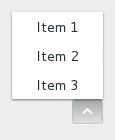 |
| left | 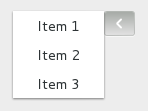 | 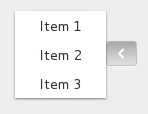 | 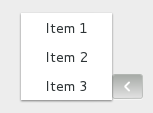 |
| right | 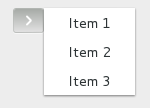 | 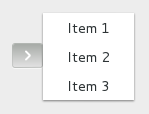 | 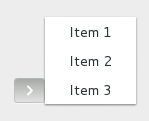 |
§CSS nodes
menubutton
╰── button.toggle
╰── <content>
╰── [arrow]MenuButton has a single CSS node with name menubutton
which contains a button node with a .toggle style class.
If the button contains an icon, it will have the .image-button style class,
if it contains text, it will have .text-button style class. If an arrow is
visible in addition to an icon, text or a custom child, it will also have
.arrow-button style class.
Inside the toggle button content, there is an arrow node for
the indicator, which will carry one of the .none, .up, .down,
.left or .right style classes to indicate the direction that
the menu will appear in. The CSS is expected to provide a suitable
image for each of these cases using the -gtk-icon-source property.
Optionally, the menubutton node can carry the .circular style class
to request a round appearance.
§Accessibility
MenuButton uses the [enum@Gtk.AccessibleRole.button] role.
§Properties
§active
Whether the menu button is active.
Readable | Writeable
§always-show-arrow
Whether to show a dropdown arrow even when using an icon or a custom child.
Readable | Writeable
§can-shrink
Whether the size of the button can be made smaller than the natural size of its contents.
Readable | Writeable
§child
The child widget.
Readable | Writeable
§direction
The ArrowType representing the direction in which the
menu or popover will be popped out.
Readable | Writeable
§has-frame
Whether the button has a frame.
Readable | Writeable
§icon-name
The name of the icon used to automatically populate the button.
Readable | Writeable
§label
The label for the button.
Readable | Writeable
§menu-model
The GMenuModel from which the popup will be created.
See MenuButton::set_menu_model() for the interaction
with the popover property.
Readable | Writeable
§popover
The Popover that will be popped up when the button is clicked.
Readable | Writeable
§primary
Whether the menu button acts as a primary menu.
Primary menus can be opened using the F10 key
Readable | Writeable
§use-underline
If set an underscore in the text indicates a mnemonic.
Readable | Writeable
Widget
§can-focus
Whether the widget or any of its descendents can accept the input focus.
This property is meant to be set by widget implementations, typically in their instance init function.
Readable | Writeable
§can-target
Whether the widget can receive pointer events.
Readable | Writeable
§css-classes
A list of css classes applied to this widget.
Readable | Writeable
§css-name
The name of this widget in the CSS tree.
This property is meant to be set by widget implementations, typically in their instance init function.
Readable | Writeable | Construct Only
§cursor
The cursor used by @widget.
Readable | Writeable
§focus-on-click
Whether the widget should grab focus when it is clicked with the mouse.
This property is only relevant for widgets that can take focus.
Readable | Writeable
§focusable
Whether this widget itself will accept the input focus.
Readable | Writeable
§halign
How to distribute horizontal space if widget gets extra space.
Readable | Writeable
§has-default
Whether the widget is the default widget.
Readable
§has-focus
Whether the widget has the input focus.
Readable
§has-tooltip
Enables or disables the emission of the query-tooltip
signal on @widget.
A true value indicates that @widget can have a tooltip, in this case
the widget will be queried using query-tooltip to
determine whether it will provide a tooltip or not.
Readable | Writeable
§height-request
Overrides for height request of the widget.
If this is -1, the natural request will be used.
Readable | Writeable
§hexpand
Whether to expand horizontally.
Readable | Writeable
§hexpand-set
Whether to use the hexpand property.
Readable | Writeable
§layout-manager
The LayoutManager instance to use to compute
the preferred size of the widget, and allocate its children.
This property is meant to be set by widget implementations, typically in their instance init function.
Readable | Writeable
§limit-events
Makes this widget act like a modal dialog, with respect to event delivery.
Global event controllers will not handle events with targets
inside the widget, unless they are set up to ignore propagation
limits. See EventControllerExt::set_propagation_limit().
Readable | Writeable
§margin-bottom
Margin on bottom side of widget.
This property adds margin outside of the widget’s normal size
request, the margin will be added in addition to the size from
WidgetExt::set_size_request() for example.
Readable | Writeable
§margin-end
Margin on end of widget, horizontally.
This property supports left-to-right and right-to-left text directions.
This property adds margin outside of the widget’s normal size
request, the margin will be added in addition to the size from
WidgetExt::set_size_request() for example.
Readable | Writeable
§margin-start
Margin on start of widget, horizontally.
This property supports left-to-right and right-to-left text directions.
This property adds margin outside of the widget’s normal size
request, the margin will be added in addition to the size from
WidgetExt::set_size_request() for example.
Readable | Writeable
§margin-top
Margin on top side of widget.
This property adds margin outside of the widget’s normal size
request, the margin will be added in addition to the size from
WidgetExt::set_size_request() for example.
Readable | Writeable
§name
The name of the widget.
Readable | Writeable
§opacity
The requested opacity of the widget.
Readable | Writeable
§overflow
How content outside the widget’s content area is treated.
This property is meant to be set by widget implementations, typically in their instance init function.
Readable | Writeable
§parent
The parent widget of this widget.
Readable
§receives-default
Whether the widget will receive the default action when it is focused.
Readable | Writeable
§root
The Root widget of the widget tree containing this widget.
This will be NULL if the widget is not contained in a root widget.
Readable
§scale-factor
The scale factor of the widget.
Readable
§sensitive
Whether the widget responds to input.
Readable | Writeable
§tooltip-markup
Sets the text of tooltip to be the given string, which is marked up with Pango markup.
Also see Tooltip::set_markup().
This is a convenience property which will take care of getting the
tooltip shown if the given string is not NULL:
has-tooltip will automatically be set to true
and there will be taken care of query-tooltip in
the default signal handler.
Note that if both tooltip-text and
tooltip-markup are set, the last one wins.
Readable | Writeable
§tooltip-text
Sets the text of tooltip to be the given string.
Also see Tooltip::set_text().
This is a convenience property which will take care of getting the
tooltip shown if the given string is not NULL:
has-tooltip will automatically be set to true
and there will be taken care of query-tooltip in
the default signal handler.
Note that if both tooltip-text and
tooltip-markup are set, the last one wins.
Readable | Writeable
§valign
How to distribute vertical space if widget gets extra space.
Readable | Writeable
§vexpand
Whether to expand vertically.
Readable | Writeable
§vexpand-set
Whether to use the vexpand property.
Readable | Writeable
§visible
Whether the widget is visible.
Readable | Writeable
§width-request
Overrides for width request of the widget.
If this is -1, the natural request will be used.
Readable | Writeable
Accessible
§accessible-role
The accessible role of the given Accessible implementation.
The accessible role cannot be changed once set.
Readable | Writeable
§Signals
§activate
Emitted to when the menu button is activated.
The ::activate signal on MenuButton is an action signal and
emitting it causes the button to pop up its menu.
Action
Widget
§destroy
Signals that all holders of a reference to the widget should release the reference that they hold.
May result in finalization of the widget if all references are released.
This signal is not suitable for saving widget state.
§direction-changed
Emitted when the text direction of a widget changes.
§hide
Emitted when @widget is hidden.
§keynav-failed
Emitted if keyboard navigation fails.
See WidgetExt::keynav_failed() for details.
§map
Emitted when @widget is going to be mapped.
A widget is mapped when the widget is visible (which is controlled with
visible) and all its parents up to the toplevel widget
are also visible.
The ::map signal can be used to determine whether a widget will be drawn,
for instance it can resume an animation that was stopped during the
emission of unmap.
§mnemonic-activate
Emitted when a widget is activated via a mnemonic.
The default handler for this signal activates @widget if @group_cycling is false, or just makes @widget grab focus if @group_cycling is true.
§move-focus
Emitted when the focus is moved.
The ::move-focus signal is a keybinding signal.
The default bindings for this signal are Tab to move forward, and Shift+Tab to move backward.
Action
§query-tooltip
Emitted when the widget’s tooltip is about to be shown.
This happens when the has-tooltip property
is true and the hover timeout has expired with the cursor hovering
above @widget; or emitted when @widget got focus in keyboard mode.
Using the given coordinates, the signal handler should determine whether a tooltip should be shown for @widget. If this is the case true should be returned, false otherwise. Note that if @keyboard_mode is true, the values of @x and @y are undefined and should not be used.
The signal handler is free to manipulate @tooltip with the therefore destined function calls.
§realize
Emitted when @widget is associated with a gdk::Surface.
This means that WidgetExt::realize() has been called
or the widget has been mapped (that is, it is going to be drawn).
§show
Emitted when @widget is shown.
§state-flags-changed
Emitted when the widget state changes.
§unmap
Emitted when @widget is going to be unmapped.
A widget is unmapped when either it or any of its parents up to the toplevel widget have been set as hidden.
As ::unmap indicates that a widget will not be shown any longer,
it can be used to, for example, stop an animation on the widget.
§unrealize
Emitted when the gdk::Surface associated with @widget is destroyed.
This means that WidgetExt::unrealize() has been called
or the widget has been unmapped (that is, it is going to be hidden).
§Implements
WidgetExt, [trait@glib::ObjectExt], AccessibleExt, BuildableExt, ConstraintTargetExt, WidgetExtManual, AccessibleExtManual
GLib type: GObject with reference counted clone semantics.
Implementations§
Source§impl MenuButton
impl MenuButton
Sourcepub fn new() -> MenuButton
pub fn new() -> MenuButton
Creates a new MenuButton widget with downwards-pointing
arrow as the only child.
You can replace the child widget with another Widget
should you wish to.
§Returns
The newly created MenuButton
Sourcepub fn builder() -> MenuButtonBuilder
pub fn builder() -> MenuButtonBuilder
Creates a new builder-pattern struct instance to construct MenuButton objects.
This method returns an instance of MenuButtonBuilder which can be used to create MenuButton objects.
Sourcepub fn must_always_show_arrow(&self) -> bool
Available on crate feature v4_4 only.
pub fn must_always_show_arrow(&self) -> bool
v4_4 only.Gets whether to show a dropdown arrow even when using an icon or a custom child.
§Returns
whether to show a dropdown arrow even when using an icon or a custom child.
Sourcepub fn can_shrink(&self) -> bool
Available on crate feature v4_12 only.
pub fn can_shrink(&self) -> bool
v4_12 only.Retrieves whether the button can be smaller than the natural size of its contents.
§Returns
true if the button can shrink, and false otherwise
Sourcepub fn is_primary(&self) -> bool
Available on crate feature v4_4 only.
pub fn is_primary(&self) -> bool
v4_4 only.Sourcepub fn uses_underline(&self) -> bool
pub fn uses_underline(&self) -> bool
Sourcepub fn set_active(&self, active: bool)
Available on crate feature v4_10 only.
pub fn set_active(&self, active: bool)
v4_10 only.Sourcepub fn set_always_show_arrow(&self, always_show_arrow: bool)
Available on crate feature v4_4 only.
pub fn set_always_show_arrow(&self, always_show_arrow: bool)
v4_4 only.Sets whether to show a dropdown arrow even when using an icon or a custom child.
§always_show_arrow
whether to show a dropdown arrow even when using an icon or a custom child
Sourcepub fn set_can_shrink(&self, can_shrink: bool)
Available on crate feature v4_12 only.
pub fn set_can_shrink(&self, can_shrink: bool)
v4_12 only.Sets whether the button size can be smaller than the natural size of its contents.
For text buttons, setting @can_shrink to true will ellipsize the label.
For icon buttons, this function has no effect.
§can_shrink
whether the button can shrink
Sourcepub fn set_child(&self, child: Option<&impl IsA<Widget>>)
Available on crate feature v4_6 only.
pub fn set_child(&self, child: Option<&impl IsA<Widget>>)
v4_6 only.Sets the child widget of @self.
Setting a child resets label and
icon-name.
If always-show-arrow is set to TRUE and
direction is not GTK_ARROW_NONE, a dropdown arrow
will be shown next to the child.
§child
the child widget
Sourcepub fn set_create_popup_func<P: Fn(&MenuButton) + 'static>(&self, func: P)
pub fn set_create_popup_func<P: Fn(&MenuButton) + 'static>(&self, func: P)
Sets @func to be called when a popup is about to be shown.
@func should use one of
to set a popup for @self.
If @func is non-None, @self will always be sensitive.
Using this function will not reset the menu widget attached to @self. Instead, this can be done manually in @func.
§func
function
to call when a popup is about to be shown, but none has been provided via other means,
or None to reset to default behavior
§destroy_notify
destroy notify for @user_data
Sourcepub fn set_direction(&self, direction: ArrowType)
pub fn set_direction(&self, direction: ArrowType)
Sets the direction in which the popup will be popped up.
If the button is automatically populated with an arrow icon, its direction will be changed to match.
If the does not fit in the available space in the given direction, GTK will its best to keep it inside the screen and fully visible.
If you pass ArrowType::None for a @direction, the popup will behave
as if you passed ArrowType::Down (although you won’t see any arrows).
§direction
Sourcepub fn set_has_frame(&self, has_frame: bool)
pub fn set_has_frame(&self, has_frame: bool)
Sourcepub fn set_icon_name(&self, icon_name: &str)
pub fn set_icon_name(&self, icon_name: &str)
Sets the name of an icon to show inside the menu button.
Setting icon name resets label and
child.
If always-show-arrow is set to TRUE and
direction is not GTK_ARROW_NONE, a dropdown arrow
will be shown next to the icon.
§icon_name
the icon name
Sets the GMenuModel from which the popup will be constructed.
If @menu_model is None, the button is disabled.
A Popover will be created from the menu model with
PopoverMenu::from_model(). Actions will be connected
as documented for this function.
If popover is already set, it will be
dissociated from the @self, and the property is set to None.
§menu_model
a GMenuModel, or None to unset and disable the
button
Sourcepub fn set_popover(&self, popover: Option<&impl IsA<Popover>>)
pub fn set_popover(&self, popover: Option<&impl IsA<Popover>>)
Sourcepub fn set_primary(&self, primary: bool)
Available on crate feature v4_4 only.
pub fn set_primary(&self, primary: bool)
v4_4 only.Sets whether menu button acts as a primary menu.
Primary menus can be opened with the F10 key.
§primary
whether the menubutton should act as a primary menu
Sourcepub fn set_use_underline(&self, use_underline: bool)
pub fn set_use_underline(&self, use_underline: bool)
Sourcepub fn connect_activate<F: Fn(&Self) + 'static>(&self, f: F) -> SignalHandlerId
Available on crate feature v4_4 only.
pub fn connect_activate<F: Fn(&Self) + 'static>(&self, f: F) -> SignalHandlerId
v4_4 only.Emitted to when the menu button is activated.
The ::activate signal on MenuButton is an action signal and
emitting it causes the button to pop up its menu.
pub fn emit_activate(&self)
v4_4 only.pub fn connect_active_notify<F: Fn(&Self) + 'static>( &self, f: F, ) -> SignalHandlerId
v4_10 only.pub fn connect_always_show_arrow_notify<F: Fn(&Self) + 'static>( &self, f: F, ) -> SignalHandlerId
v4_4 only.pub fn connect_can_shrink_notify<F: Fn(&Self) + 'static>( &self, f: F, ) -> SignalHandlerId
v4_12 only.pub fn connect_child_notify<F: Fn(&Self) + 'static>( &self, f: F, ) -> SignalHandlerId
v4_6 only.pub fn connect_direction_notify<F: Fn(&Self) + 'static>( &self, f: F, ) -> SignalHandlerId
pub fn connect_has_frame_notify<F: Fn(&Self) + 'static>( &self, f: F, ) -> SignalHandlerId
pub fn connect_icon_name_notify<F: Fn(&Self) + 'static>( &self, f: F, ) -> SignalHandlerId
pub fn connect_label_notify<F: Fn(&Self) + 'static>( &self, f: F, ) -> SignalHandlerId
pub fn connect_popover_notify<F: Fn(&Self) + 'static>( &self, f: F, ) -> SignalHandlerId
pub fn connect_primary_notify<F: Fn(&Self) + 'static>( &self, f: F, ) -> SignalHandlerId
v4_4 only.pub fn connect_use_underline_notify<F: Fn(&Self) + 'static>( &self, f: F, ) -> SignalHandlerId
Source§impl MenuButton
impl MenuButton
pub fn unset_create_popup_func(&self)
Trait Implementations§
Source§impl Clone for MenuButton
impl Clone for MenuButton
Source§impl Debug for MenuButton
impl Debug for MenuButton
Source§impl Default for MenuButton
impl Default for MenuButton
Source§impl HasParamSpec for MenuButton
impl HasParamSpec for MenuButton
type ParamSpec = ParamSpecObject
Source§type SetValue = MenuButton
type SetValue = MenuButton
type BuilderFn = fn(&str) -> ParamSpecObjectBuilder<'_, MenuButton>
fn param_spec_builder() -> Self::BuilderFn
Source§impl Hash for MenuButton
impl Hash for MenuButton
Source§impl Ord for MenuButton
impl Ord for MenuButton
Source§fn cmp(&self, other: &Self) -> Ordering
fn cmp(&self, other: &Self) -> Ordering
Comparison for two GObjects.
Compares the memory addresses of the provided objects.
1.21.0 · Source§fn max(self, other: Self) -> Selfwhere
Self: Sized,
fn max(self, other: Self) -> Selfwhere
Self: Sized,
Source§impl ParentClassIs for MenuButton
impl ParentClassIs for MenuButton
Source§impl<OT: ObjectType> PartialEq<OT> for MenuButton
impl<OT: ObjectType> PartialEq<OT> for MenuButton
Source§impl<OT: ObjectType> PartialOrd<OT> for MenuButton
impl<OT: ObjectType> PartialOrd<OT> for MenuButton
Source§impl StaticType for MenuButton
impl StaticType for MenuButton
Source§fn static_type() -> Type
fn static_type() -> Type
Self.impl Eq for MenuButton
impl IsA<Accessible> for MenuButton
impl IsA<Buildable> for MenuButton
impl IsA<ConstraintTarget> for MenuButton
impl IsA<Widget> for MenuButton
Auto Trait Implementations§
impl Freeze for MenuButton
impl RefUnwindSafe for MenuButton
impl !Send for MenuButton
impl !Sync for MenuButton
impl Unpin for MenuButton
impl UnwindSafe for MenuButton
Blanket Implementations§
Source§impl<O> AccessibleExt for Owhere
O: IsA<Accessible>,
impl<O> AccessibleExt for Owhere
O: IsA<Accessible>,
Source§fn announce(&self, message: &str, priority: AccessibleAnnouncementPriority)
fn announce(&self, message: &str, priority: AccessibleAnnouncementPriority)
v4_14 only.Source§fn accessible_parent(&self) -> Option<Accessible>
fn accessible_parent(&self) -> Option<Accessible>
v4_10 only.Source§fn accessible_role(&self) -> AccessibleRole
fn accessible_role(&self) -> AccessibleRole
Source§fn at_context(&self) -> ATContext
fn at_context(&self) -> ATContext
v4_10 only.Source§fn bounds(&self) -> Option<(i32, i32, i32, i32)>
fn bounds(&self) -> Option<(i32, i32, i32, i32)>
v4_10 only.Source§fn first_accessible_child(&self) -> Option<Accessible>
fn first_accessible_child(&self) -> Option<Accessible>
v4_10 only.Source§fn next_accessible_sibling(&self) -> Option<Accessible>
fn next_accessible_sibling(&self) -> Option<Accessible>
v4_10 only.Source§fn platform_state(&self, state: AccessiblePlatformState) -> bool
fn platform_state(&self, state: AccessiblePlatformState) -> bool
v4_10 only.Source§fn reset_property(&self, property: AccessibleProperty)
fn reset_property(&self, property: AccessibleProperty)
Source§fn reset_relation(&self, relation: AccessibleRelation)
fn reset_relation(&self, relation: AccessibleRelation)
Source§fn reset_state(&self, state: AccessibleState)
fn reset_state(&self, state: AccessibleState)
Source§fn set_accessible_parent(
&self,
parent: Option<&impl IsA<Accessible>>,
next_sibling: Option<&impl IsA<Accessible>>,
)
fn set_accessible_parent( &self, parent: Option<&impl IsA<Accessible>>, next_sibling: Option<&impl IsA<Accessible>>, )
v4_10 only.Source§fn update_next_accessible_sibling(
&self,
new_sibling: Option<&impl IsA<Accessible>>,
)
fn update_next_accessible_sibling( &self, new_sibling: Option<&impl IsA<Accessible>>, )
v4_10 only.Source§fn update_platform_state(&self, state: AccessiblePlatformState)
fn update_platform_state(&self, state: AccessiblePlatformState)
v4_18 only.Source§fn set_accessible_role(&self, accessible_role: AccessibleRole)
fn set_accessible_role(&self, accessible_role: AccessibleRole)
Accessible implementation. Read morefn connect_accessible_role_notify<F: Fn(&Self) + 'static>( &self, f: F, ) -> SignalHandlerId
Source§impl<O> AccessibleExtManual for Owhere
O: IsA<Accessible>,
impl<O> AccessibleExtManual for Owhere
O: IsA<Accessible>,
Source§fn update_property(&self, properties: &[Property<'_>])
fn update_property(&self, properties: &[Property<'_>])
Source§fn update_relation(&self, relations: &[Relation<'_>])
fn update_relation(&self, relations: &[Relation<'_>])
Source§fn update_state(&self, states: &[State])
fn update_state(&self, states: &[State])
Source§impl<T> BorrowMut<T> for Twhere
T: ?Sized,
impl<T> BorrowMut<T> for Twhere
T: ?Sized,
Source§fn borrow_mut(&mut self) -> &mut T
fn borrow_mut(&mut self) -> &mut T
Source§impl<O> BuildableExt for O
impl<O> BuildableExt for O
Source§impl<T> Cast for Twhere
T: ObjectType,
impl<T> Cast for Twhere
T: ObjectType,
Source§fn upcast<T>(self) -> Twhere
T: ObjectType,
Self: IsA<T>,
fn upcast<T>(self) -> Twhere
T: ObjectType,
Self: IsA<T>,
T. Read moreSource§fn upcast_ref<T>(&self) -> &Twhere
T: ObjectType,
Self: IsA<T>,
fn upcast_ref<T>(&self) -> &Twhere
T: ObjectType,
Self: IsA<T>,
T. Read moreSource§fn downcast<T>(self) -> Result<T, Self>where
T: ObjectType,
Self: MayDowncastTo<T>,
fn downcast<T>(self) -> Result<T, Self>where
T: ObjectType,
Self: MayDowncastTo<T>,
T. Read moreSource§fn downcast_ref<T>(&self) -> Option<&T>where
T: ObjectType,
Self: MayDowncastTo<T>,
fn downcast_ref<T>(&self) -> Option<&T>where
T: ObjectType,
Self: MayDowncastTo<T>,
T. Read moreSource§fn dynamic_cast<T>(self) -> Result<T, Self>where
T: ObjectType,
fn dynamic_cast<T>(self) -> Result<T, Self>where
T: ObjectType,
T. This handles upcasting, downcasting
and casting between interface and interface implementors. All checks are performed at
runtime, while upcast will do many checks at compile-time already. downcast will
perform the same checks at runtime as dynamic_cast, but will also ensure some amount of
compile-time safety. Read moreSource§fn dynamic_cast_ref<T>(&self) -> Option<&T>where
T: ObjectType,
fn dynamic_cast_ref<T>(&self) -> Option<&T>where
T: ObjectType,
T. This handles upcasting, downcasting
and casting between interface and interface implementors. All checks are performed at
runtime, while downcast and upcast will do many checks at compile-time already. Read moreSource§unsafe fn unsafe_cast<T>(self) -> Twhere
T: ObjectType,
unsafe fn unsafe_cast<T>(self) -> Twhere
T: ObjectType,
T unconditionally. Read moreSource§unsafe fn unsafe_cast_ref<T>(&self) -> &Twhere
T: ObjectType,
unsafe fn unsafe_cast_ref<T>(&self) -> &Twhere
T: ObjectType,
&T unconditionally. Read moreSource§impl<T> CloneToUninit for Twhere
T: Clone,
impl<T> CloneToUninit for Twhere
T: Clone,
Source§impl<T> FromGlibContainerAsVec<<T as GlibPtrDefault>::GlibType, *const GList> for Twhere
T: GlibPtrDefault + FromGlibPtrNone<<T as GlibPtrDefault>::GlibType> + FromGlibPtrFull<<T as GlibPtrDefault>::GlibType>,
impl<T> FromGlibContainerAsVec<<T as GlibPtrDefault>::GlibType, *const GList> for Twhere
T: GlibPtrDefault + FromGlibPtrNone<<T as GlibPtrDefault>::GlibType> + FromGlibPtrFull<<T as GlibPtrDefault>::GlibType>,
Source§impl<T> FromGlibContainerAsVec<<T as GlibPtrDefault>::GlibType, *const GPtrArray> for Twhere
T: GlibPtrDefault + FromGlibPtrNone<<T as GlibPtrDefault>::GlibType> + FromGlibPtrFull<<T as GlibPtrDefault>::GlibType>,
impl<T> FromGlibContainerAsVec<<T as GlibPtrDefault>::GlibType, *const GPtrArray> for Twhere
T: GlibPtrDefault + FromGlibPtrNone<<T as GlibPtrDefault>::GlibType> + FromGlibPtrFull<<T as GlibPtrDefault>::GlibType>,
Source§impl<T> FromGlibContainerAsVec<<T as GlibPtrDefault>::GlibType, *const GSList> for Twhere
T: GlibPtrDefault + FromGlibPtrNone<<T as GlibPtrDefault>::GlibType> + FromGlibPtrFull<<T as GlibPtrDefault>::GlibType>,
impl<T> FromGlibContainerAsVec<<T as GlibPtrDefault>::GlibType, *const GSList> for Twhere
T: GlibPtrDefault + FromGlibPtrNone<<T as GlibPtrDefault>::GlibType> + FromGlibPtrFull<<T as GlibPtrDefault>::GlibType>,
Source§impl<T> FromGlibContainerAsVec<<T as GlibPtrDefault>::GlibType, *mut GList> for Twhere
T: GlibPtrDefault + FromGlibPtrNone<<T as GlibPtrDefault>::GlibType> + FromGlibPtrFull<<T as GlibPtrDefault>::GlibType>,
impl<T> FromGlibContainerAsVec<<T as GlibPtrDefault>::GlibType, *mut GList> for Twhere
T: GlibPtrDefault + FromGlibPtrNone<<T as GlibPtrDefault>::GlibType> + FromGlibPtrFull<<T as GlibPtrDefault>::GlibType>,
Source§impl<T> FromGlibContainerAsVec<<T as GlibPtrDefault>::GlibType, *mut GPtrArray> for Twhere
T: GlibPtrDefault + FromGlibPtrNone<<T as GlibPtrDefault>::GlibType> + FromGlibPtrFull<<T as GlibPtrDefault>::GlibType>,
impl<T> FromGlibContainerAsVec<<T as GlibPtrDefault>::GlibType, *mut GPtrArray> for Twhere
T: GlibPtrDefault + FromGlibPtrNone<<T as GlibPtrDefault>::GlibType> + FromGlibPtrFull<<T as GlibPtrDefault>::GlibType>,
Source§impl<T> FromGlibContainerAsVec<<T as GlibPtrDefault>::GlibType, *mut GSList> for Twhere
T: GlibPtrDefault + FromGlibPtrNone<<T as GlibPtrDefault>::GlibType> + FromGlibPtrFull<<T as GlibPtrDefault>::GlibType>,
impl<T> FromGlibContainerAsVec<<T as GlibPtrDefault>::GlibType, *mut GSList> for Twhere
T: GlibPtrDefault + FromGlibPtrNone<<T as GlibPtrDefault>::GlibType> + FromGlibPtrFull<<T as GlibPtrDefault>::GlibType>,
Source§impl<T> FromGlibPtrArrayContainerAsVec<<T as GlibPtrDefault>::GlibType, *const GList> for Twhere
T: GlibPtrDefault + FromGlibPtrNone<<T as GlibPtrDefault>::GlibType> + FromGlibPtrFull<<T as GlibPtrDefault>::GlibType>,
impl<T> FromGlibPtrArrayContainerAsVec<<T as GlibPtrDefault>::GlibType, *const GList> for Twhere
T: GlibPtrDefault + FromGlibPtrNone<<T as GlibPtrDefault>::GlibType> + FromGlibPtrFull<<T as GlibPtrDefault>::GlibType>,
unsafe fn from_glib_none_as_vec(ptr: *const GList) -> Vec<T>
unsafe fn from_glib_container_as_vec(_: *const GList) -> Vec<T>
unsafe fn from_glib_full_as_vec(_: *const GList) -> Vec<T>
Source§impl<T> FromGlibPtrArrayContainerAsVec<<T as GlibPtrDefault>::GlibType, *const GPtrArray> for Twhere
T: GlibPtrDefault + FromGlibPtrNone<<T as GlibPtrDefault>::GlibType> + FromGlibPtrFull<<T as GlibPtrDefault>::GlibType>,
impl<T> FromGlibPtrArrayContainerAsVec<<T as GlibPtrDefault>::GlibType, *const GPtrArray> for Twhere
T: GlibPtrDefault + FromGlibPtrNone<<T as GlibPtrDefault>::GlibType> + FromGlibPtrFull<<T as GlibPtrDefault>::GlibType>,
unsafe fn from_glib_none_as_vec(ptr: *const GPtrArray) -> Vec<T>
unsafe fn from_glib_container_as_vec(_: *const GPtrArray) -> Vec<T>
unsafe fn from_glib_full_as_vec(_: *const GPtrArray) -> Vec<T>
Source§impl<T> FromGlibPtrArrayContainerAsVec<<T as GlibPtrDefault>::GlibType, *const GSList> for Twhere
T: GlibPtrDefault + FromGlibPtrNone<<T as GlibPtrDefault>::GlibType> + FromGlibPtrFull<<T as GlibPtrDefault>::GlibType>,
impl<T> FromGlibPtrArrayContainerAsVec<<T as GlibPtrDefault>::GlibType, *const GSList> for Twhere
T: GlibPtrDefault + FromGlibPtrNone<<T as GlibPtrDefault>::GlibType> + FromGlibPtrFull<<T as GlibPtrDefault>::GlibType>,
unsafe fn from_glib_none_as_vec(ptr: *const GSList) -> Vec<T>
unsafe fn from_glib_container_as_vec(_: *const GSList) -> Vec<T>
unsafe fn from_glib_full_as_vec(_: *const GSList) -> Vec<T>
Source§impl<T> FromGlibPtrArrayContainerAsVec<<T as GlibPtrDefault>::GlibType, *mut GList> for Twhere
T: GlibPtrDefault + FromGlibPtrNone<<T as GlibPtrDefault>::GlibType> + FromGlibPtrFull<<T as GlibPtrDefault>::GlibType>,
impl<T> FromGlibPtrArrayContainerAsVec<<T as GlibPtrDefault>::GlibType, *mut GList> for Twhere
T: GlibPtrDefault + FromGlibPtrNone<<T as GlibPtrDefault>::GlibType> + FromGlibPtrFull<<T as GlibPtrDefault>::GlibType>,
unsafe fn from_glib_none_as_vec(ptr: *mut GList) -> Vec<T>
unsafe fn from_glib_container_as_vec(ptr: *mut GList) -> Vec<T>
unsafe fn from_glib_full_as_vec(ptr: *mut GList) -> Vec<T>
Source§impl<T> FromGlibPtrArrayContainerAsVec<<T as GlibPtrDefault>::GlibType, *mut GPtrArray> for Twhere
T: GlibPtrDefault + FromGlibPtrNone<<T as GlibPtrDefault>::GlibType> + FromGlibPtrFull<<T as GlibPtrDefault>::GlibType>,
impl<T> FromGlibPtrArrayContainerAsVec<<T as GlibPtrDefault>::GlibType, *mut GPtrArray> for Twhere
T: GlibPtrDefault + FromGlibPtrNone<<T as GlibPtrDefault>::GlibType> + FromGlibPtrFull<<T as GlibPtrDefault>::GlibType>,
unsafe fn from_glib_none_as_vec(ptr: *mut GPtrArray) -> Vec<T>
unsafe fn from_glib_container_as_vec(ptr: *mut GPtrArray) -> Vec<T>
unsafe fn from_glib_full_as_vec(ptr: *mut GPtrArray) -> Vec<T>
Source§impl<T> FromGlibPtrArrayContainerAsVec<<T as GlibPtrDefault>::GlibType, *mut GSList> for Twhere
T: GlibPtrDefault + FromGlibPtrNone<<T as GlibPtrDefault>::GlibType> + FromGlibPtrFull<<T as GlibPtrDefault>::GlibType>,
impl<T> FromGlibPtrArrayContainerAsVec<<T as GlibPtrDefault>::GlibType, *mut GSList> for Twhere
T: GlibPtrDefault + FromGlibPtrNone<<T as GlibPtrDefault>::GlibType> + FromGlibPtrFull<<T as GlibPtrDefault>::GlibType>,
unsafe fn from_glib_none_as_vec(ptr: *mut GSList) -> Vec<T>
unsafe fn from_glib_container_as_vec(ptr: *mut GSList) -> Vec<T>
unsafe fn from_glib_full_as_vec(ptr: *mut GSList) -> Vec<T>
Source§impl<O> GObjectPropertyExpressionExt for O
impl<O> GObjectPropertyExpressionExt for O
Source§fn property_expression(&self, property_name: &str) -> PropertyExpression
fn property_expression(&self, property_name: &str) -> PropertyExpression
Source§fn property_expression_weak(&self, property_name: &str) -> PropertyExpression
fn property_expression_weak(&self, property_name: &str) -> PropertyExpression
Source§fn this_expression(property_name: &str) -> PropertyExpression
fn this_expression(property_name: &str) -> PropertyExpression
this object.Source§impl<T> IntoClosureReturnValue for T
impl<T> IntoClosureReturnValue for T
fn into_closure_return_value(self) -> Option<Value>
Source§impl<U> IsSubclassableExt for Uwhere
U: IsClass + ParentClassIs,
impl<U> IsSubclassableExt for Uwhere
U: IsClass + ParentClassIs,
fn parent_class_init<T>(class: &mut Class<U>)
fn parent_instance_init<T>(instance: &mut InitializingObject<T>)
Source§impl<T> ObjectExt for Twhere
T: ObjectType,
impl<T> ObjectExt for Twhere
T: ObjectType,
Source§fn is<U>(&self) -> boolwhere
U: StaticType,
fn is<U>(&self) -> boolwhere
U: StaticType,
true if the object is an instance of (can be cast to) T.Source§fn object_class(&self) -> &Class<Object>
fn object_class(&self) -> &Class<Object>
ObjectClass of the object. Read moreSource§fn class_of<U>(&self) -> Option<&Class<U>>where
U: IsClass,
fn class_of<U>(&self) -> Option<&Class<U>>where
U: IsClass,
T. Read moreSource§fn interface<U>(&self) -> Option<InterfaceRef<'_, U>>where
U: IsInterface,
fn interface<U>(&self) -> Option<InterfaceRef<'_, U>>where
U: IsInterface,
T of the object. Read moreSource§fn set_property_from_value(&self, property_name: &str, value: &Value)
fn set_property_from_value(&self, property_name: &str, value: &Value)
Source§fn set_properties(&self, property_values: &[(&str, &dyn ToValue)])
fn set_properties(&self, property_values: &[(&str, &dyn ToValue)])
Source§fn set_properties_from_value(&self, property_values: &[(&str, Value)])
fn set_properties_from_value(&self, property_values: &[(&str, Value)])
Source§fn property<V>(&self, property_name: &str) -> Vwhere
V: for<'b> FromValue<'b> + 'static,
fn property<V>(&self, property_name: &str) -> Vwhere
V: for<'b> FromValue<'b> + 'static,
property_name of the object and cast it to the type V. Read moreSource§fn property_value(&self, property_name: &str) -> Value
fn property_value(&self, property_name: &str) -> Value
property_name of the object. Read moreSource§fn has_property(&self, property_name: &str) -> bool
fn has_property(&self, property_name: &str) -> bool
property_name.Source§fn has_property_with_type(&self, property_name: &str, type_: Type) -> bool
fn has_property_with_type(&self, property_name: &str, type_: Type) -> bool
property_name of the given type_.Source§fn property_type(&self, property_name: &str) -> Option<Type>
fn property_type(&self, property_name: &str) -> Option<Type>
property_name of this object. Read moreSource§fn find_property(&self, property_name: &str) -> Option<ParamSpec>
fn find_property(&self, property_name: &str) -> Option<ParamSpec>
ParamSpec of the property property_name of this object.Source§fn list_properties(&self) -> PtrSlice<ParamSpec>
fn list_properties(&self) -> PtrSlice<ParamSpec>
ParamSpec of the properties of this object.Source§fn freeze_notify(&self) -> PropertyNotificationFreezeGuard
fn freeze_notify(&self) -> PropertyNotificationFreezeGuard
Source§unsafe fn set_qdata<QD>(&self, key: Quark, value: QD)where
QD: 'static,
unsafe fn set_qdata<QD>(&self, key: Quark, value: QD)where
QD: 'static,
key. Read moreSource§unsafe fn qdata<QD>(&self, key: Quark) -> Option<NonNull<QD>>where
QD: 'static,
unsafe fn qdata<QD>(&self, key: Quark) -> Option<NonNull<QD>>where
QD: 'static,
key. Read moreSource§unsafe fn steal_qdata<QD>(&self, key: Quark) -> Option<QD>where
QD: 'static,
unsafe fn steal_qdata<QD>(&self, key: Quark) -> Option<QD>where
QD: 'static,
key. Read moreSource§unsafe fn set_data<QD>(&self, key: &str, value: QD)where
QD: 'static,
unsafe fn set_data<QD>(&self, key: &str, value: QD)where
QD: 'static,
key. Read moreSource§unsafe fn data<QD>(&self, key: &str) -> Option<NonNull<QD>>where
QD: 'static,
unsafe fn data<QD>(&self, key: &str) -> Option<NonNull<QD>>where
QD: 'static,
key. Read moreSource§unsafe fn steal_data<QD>(&self, key: &str) -> Option<QD>where
QD: 'static,
unsafe fn steal_data<QD>(&self, key: &str) -> Option<QD>where
QD: 'static,
key. Read moreSource§fn block_signal(&self, handler_id: &SignalHandlerId)
fn block_signal(&self, handler_id: &SignalHandlerId)
Source§fn unblock_signal(&self, handler_id: &SignalHandlerId)
fn unblock_signal(&self, handler_id: &SignalHandlerId)
Source§fn stop_signal_emission(&self, signal_id: SignalId, detail: Option<Quark>)
fn stop_signal_emission(&self, signal_id: SignalId, detail: Option<Quark>)
Source§fn stop_signal_emission_by_name(&self, signal_name: &str)
fn stop_signal_emission_by_name(&self, signal_name: &str)
Source§fn connect<F>(
&self,
signal_name: &str,
after: bool,
callback: F,
) -> SignalHandlerId
fn connect<F>( &self, signal_name: &str, after: bool, callback: F, ) -> SignalHandlerId
signal_name on this object. Read moreSource§fn connect_id<F>(
&self,
signal_id: SignalId,
details: Option<Quark>,
after: bool,
callback: F,
) -> SignalHandlerId
fn connect_id<F>( &self, signal_id: SignalId, details: Option<Quark>, after: bool, callback: F, ) -> SignalHandlerId
signal_id on this object. Read moreSource§fn connect_local<F>(
&self,
signal_name: &str,
after: bool,
callback: F,
) -> SignalHandlerId
fn connect_local<F>( &self, signal_name: &str, after: bool, callback: F, ) -> SignalHandlerId
signal_name on this object. Read moreSource§fn connect_local_id<F>(
&self,
signal_id: SignalId,
details: Option<Quark>,
after: bool,
callback: F,
) -> SignalHandlerId
fn connect_local_id<F>( &self, signal_id: SignalId, details: Option<Quark>, after: bool, callback: F, ) -> SignalHandlerId
signal_id on this object. Read moreSource§unsafe fn connect_unsafe<F>(
&self,
signal_name: &str,
after: bool,
callback: F,
) -> SignalHandlerId
unsafe fn connect_unsafe<F>( &self, signal_name: &str, after: bool, callback: F, ) -> SignalHandlerId
signal_name on this object. Read moreSource§unsafe fn connect_unsafe_id<F>(
&self,
signal_id: SignalId,
details: Option<Quark>,
after: bool,
callback: F,
) -> SignalHandlerId
unsafe fn connect_unsafe_id<F>( &self, signal_id: SignalId, details: Option<Quark>, after: bool, callback: F, ) -> SignalHandlerId
signal_id on this object. Read moreSource§fn connect_closure(
&self,
signal_name: &str,
after: bool,
closure: RustClosure,
) -> SignalHandlerId
fn connect_closure( &self, signal_name: &str, after: bool, closure: RustClosure, ) -> SignalHandlerId
signal_name on this object. Read moreSource§fn connect_closure_id(
&self,
signal_id: SignalId,
details: Option<Quark>,
after: bool,
closure: RustClosure,
) -> SignalHandlerId
fn connect_closure_id( &self, signal_id: SignalId, details: Option<Quark>, after: bool, closure: RustClosure, ) -> SignalHandlerId
signal_id on this object. Read moreSource§fn watch_closure(&self, closure: &impl AsRef<Closure>)
fn watch_closure(&self, closure: &impl AsRef<Closure>)
closure to the lifetime of the object. When
the object’s reference count drops to zero, the closure will be
invalidated. An invalidated closure will ignore any calls to
invoke_with_values, or
invoke when using Rust closures.Source§fn emit<R>(&self, signal_id: SignalId, args: &[&dyn ToValue]) -> Rwhere
R: TryFromClosureReturnValue,
fn emit<R>(&self, signal_id: SignalId, args: &[&dyn ToValue]) -> Rwhere
R: TryFromClosureReturnValue,
Source§fn emit_with_values(&self, signal_id: SignalId, args: &[Value]) -> Option<Value>
fn emit_with_values(&self, signal_id: SignalId, args: &[Value]) -> Option<Value>
Self::emit but takes Value for the arguments.Source§fn emit_by_name<R>(&self, signal_name: &str, args: &[&dyn ToValue]) -> Rwhere
R: TryFromClosureReturnValue,
fn emit_by_name<R>(&self, signal_name: &str, args: &[&dyn ToValue]) -> Rwhere
R: TryFromClosureReturnValue,
Source§fn emit_by_name_with_values(
&self,
signal_name: &str,
args: &[Value],
) -> Option<Value>
fn emit_by_name_with_values( &self, signal_name: &str, args: &[Value], ) -> Option<Value>
Source§fn emit_by_name_with_details<R>(
&self,
signal_name: &str,
details: Quark,
args: &[&dyn ToValue],
) -> Rwhere
R: TryFromClosureReturnValue,
fn emit_by_name_with_details<R>(
&self,
signal_name: &str,
details: Quark,
args: &[&dyn ToValue],
) -> Rwhere
R: TryFromClosureReturnValue,
Source§fn emit_by_name_with_details_and_values(
&self,
signal_name: &str,
details: Quark,
args: &[Value],
) -> Option<Value>
fn emit_by_name_with_details_and_values( &self, signal_name: &str, details: Quark, args: &[Value], ) -> Option<Value>
Source§fn emit_with_details<R>(
&self,
signal_id: SignalId,
details: Quark,
args: &[&dyn ToValue],
) -> Rwhere
R: TryFromClosureReturnValue,
fn emit_with_details<R>(
&self,
signal_id: SignalId,
details: Quark,
args: &[&dyn ToValue],
) -> Rwhere
R: TryFromClosureReturnValue,
Source§fn emit_with_details_and_values(
&self,
signal_id: SignalId,
details: Quark,
args: &[Value],
) -> Option<Value>
fn emit_with_details_and_values( &self, signal_id: SignalId, details: Quark, args: &[Value], ) -> Option<Value>
Source§fn disconnect(&self, handler_id: SignalHandlerId)
fn disconnect(&self, handler_id: SignalHandlerId)
Source§fn connect_notify<F>(&self, name: Option<&str>, f: F) -> SignalHandlerId
fn connect_notify<F>(&self, name: Option<&str>, f: F) -> SignalHandlerId
notify signal of the object. Read moreSource§fn connect_notify_local<F>(&self, name: Option<&str>, f: F) -> SignalHandlerId
fn connect_notify_local<F>(&self, name: Option<&str>, f: F) -> SignalHandlerId
notify signal of the object. Read moreSource§unsafe fn connect_notify_unsafe<F>(
&self,
name: Option<&str>,
f: F,
) -> SignalHandlerId
unsafe fn connect_notify_unsafe<F>( &self, name: Option<&str>, f: F, ) -> SignalHandlerId
notify signal of the object. Read moreSource§fn notify(&self, property_name: &str)
fn notify(&self, property_name: &str)
Source§fn notify_by_pspec(&self, pspec: &ParamSpec)
fn notify_by_pspec(&self, pspec: &ParamSpec)
Source§fn add_weak_ref_notify<F>(&self, f: F) -> WeakRefNotify<T>
fn add_weak_ref_notify<F>(&self, f: F) -> WeakRefNotify<T>
Source§fn add_weak_ref_notify_local<F>(&self, f: F) -> WeakRefNotify<T>where
F: FnOnce() + 'static,
fn add_weak_ref_notify_local<F>(&self, f: F) -> WeakRefNotify<T>where
F: FnOnce() + 'static,
Source§fn bind_property<'a, 'f, 't, O>(
&'a self,
source_property: &'a str,
target: &'a O,
target_property: &'a str,
) -> BindingBuilder<'a, 'f, 't>where
O: ObjectType,
fn bind_property<'a, 'f, 't, O>(
&'a self,
source_property: &'a str,
target: &'a O,
target_property: &'a str,
) -> BindingBuilder<'a, 'f, 't>where
O: ObjectType,
Source§unsafe fn run_dispose(&self)
unsafe fn run_dispose(&self)
Source§impl<T> PropertyGet for Twhere
T: HasParamSpec,
impl<T> PropertyGet for Twhere
T: HasParamSpec,
Source§impl<T> StaticTypeExt for Twhere
T: StaticType,
impl<T> StaticTypeExt for Twhere
T: StaticType,
Source§fn ensure_type()
fn ensure_type()
Source§impl<T> TransparentType for Twhere
T: TransparentPtrType,
impl<T> TransparentType for Twhere
T: TransparentPtrType,
type GlibType = <T as GlibPtrDefault>::GlibType
Source§impl<T> TryFromClosureReturnValue for Twhere
T: for<'a> FromValue<'a> + StaticType + 'static,
impl<T> TryFromClosureReturnValue for Twhere
T: for<'a> FromValue<'a> + StaticType + 'static,
Source§impl<O> WidgetExt for O
impl<O> WidgetExt for O
Source§fn action_set_enabled(&self, action_name: &str, enabled: bool)
fn action_set_enabled(&self, action_name: &str, enabled: bool)
WidgetClassExt::install_action(). Read moreSource§fn activate_action(
&self,
name: &str,
args: Option<&Variant>,
) -> Result<(), BoolError>
fn activate_action( &self, name: &str, args: Option<&Variant>, ) -> Result<(), BoolError>
Source§fn activate_default(&self)
fn activate_default(&self)
default.activate action for the widget. Read moreSource§fn add_controller(&self, controller: impl IsA<EventController>)
fn add_controller(&self, controller: impl IsA<EventController>)
Source§fn add_css_class(&self, css_class: &str)
fn add_css_class(&self, css_class: &str)
Source§fn add_mnemonic_label(&self, label: &impl IsA<Widget>)
fn add_mnemonic_label(&self, label: &impl IsA<Widget>)
Source§fn allocate(
&self,
width: i32,
height: i32,
baseline: i32,
transform: Option<Transform>,
)
fn allocate( &self, width: i32, height: i32, baseline: i32, transform: Option<Transform>, )
Source§fn child_focus(&self, direction: DirectionType) -> bool
fn child_focus(&self, direction: DirectionType) -> bool
Source§fn compute_bounds(&self, target: &impl IsA<Widget>) -> Option<Rect>
fn compute_bounds(&self, target: &impl IsA<Widget>) -> Option<Rect>
Source§fn compute_expand(&self, orientation: Orientation) -> bool
fn compute_expand(&self, orientation: Orientation) -> bool
Source§fn compute_point(
&self,
target: &impl IsA<Widget>,
point: &Point,
) -> Option<Point>
fn compute_point( &self, target: &impl IsA<Widget>, point: &Point, ) -> Option<Point>
Source§fn compute_transform(&self, target: &impl IsA<Widget>) -> Option<Matrix>
fn compute_transform(&self, target: &impl IsA<Widget>) -> Option<Matrix>
Source§fn contains(&self, x: f64, y: f64) -> bool
fn contains(&self, x: f64, y: f64) -> bool
Source§fn create_pango_context(&self) -> Context
fn create_pango_context(&self) -> Context
pango::Context that is configured for the widget. Read moreSource§fn create_pango_layout(&self, text: Option<&str>) -> Layout
fn create_pango_layout(&self, text: Option<&str>) -> Layout
pango::Layout that is configured for the widget. Read moreSource§fn drag_check_threshold(
&self,
start_x: i32,
start_y: i32,
current_x: i32,
current_y: i32,
) -> bool
fn drag_check_threshold( &self, start_x: i32, start_y: i32, current_x: i32, current_y: i32, ) -> bool
Source§fn error_bell(&self)
fn error_bell(&self)
Source§fn allocated_baseline(&self) -> i32
fn allocated_baseline(&self) -> i32
Source§fn allocated_height(&self) -> i32
fn allocated_height(&self) -> i32
Source§fn allocated_width(&self) -> i32
fn allocated_width(&self) -> i32
Source§fn allocation(&self) -> Allocation
fn allocation(&self) -> Allocation
Source§fn ancestor(&self, widget_type: Type) -> Option<Widget>
fn ancestor(&self, widget_type: Type) -> Option<Widget>
Source§fn baseline(&self) -> i32
fn baseline(&self) -> i32
v4_12 only.Source§fn can_focus(&self) -> bool
fn can_focus(&self) -> bool
Source§fn can_target(&self) -> bool
fn can_target(&self) -> bool
Source§fn is_child_visible(&self) -> bool
fn is_child_visible(&self) -> bool
set_child_visible(). Read moreSource§fn color(&self) -> RGBA
fn color(&self) -> RGBA
v4_10 only.Source§fn css_classes(&self) -> Vec<GString>
fn css_classes(&self) -> Vec<GString>
Source§fn direction(&self) -> TextDirection
fn direction(&self) -> TextDirection
Source§fn display(&self) -> Display
fn display(&self) -> Display
Source§fn gets_focus_on_click(&self) -> bool
fn gets_focus_on_click(&self) -> bool
Source§fn is_focusable(&self) -> bool
fn is_focusable(&self) -> bool
Source§fn font_options(&self) -> Option<FontOptions>
fn font_options(&self) -> Option<FontOptions>
cairo::FontOptions of the widget. Read moreSource§fn frame_clock(&self) -> Option<FrameClock>
fn frame_clock(&self) -> Option<FrameClock>
Source§fn has_tooltip(&self) -> bool
fn has_tooltip(&self) -> bool
has-tooltip property. Read moreSource§fn hexpands(&self) -> bool
fn hexpands(&self) -> bool
Source§fn is_hexpand_set(&self) -> bool
fn is_hexpand_set(&self) -> bool
hexpand flag has been explicitly set. Read moreSource§fn layout_manager(&self) -> Option<LayoutManager>
fn layout_manager(&self) -> Option<LayoutManager>
Source§fn is_limit_events(&self) -> bool
fn is_limit_events(&self) -> bool
v4_18 only.limit-events property.Source§fn margin_bottom(&self) -> i32
fn margin_bottom(&self) -> i32
Source§fn margin_end(&self) -> i32
fn margin_end(&self) -> i32
Source§fn margin_start(&self) -> i32
fn margin_start(&self) -> i32
Source§fn margin_top(&self) -> i32
fn margin_top(&self) -> i32
Source§fn widget_name(&self) -> GString
fn widget_name(&self) -> GString
Source§fn pango_context(&self) -> Context
fn pango_context(&self) -> Context
pango::Context that is configured for the widget. Read moreSource§fn preferred_size(&self) -> (Requisition, Requisition)
fn preferred_size(&self) -> (Requisition, Requisition)
Source§fn primary_clipboard(&self) -> Clipboard
fn primary_clipboard(&self) -> Clipboard
Source§fn is_realized(&self) -> bool
fn is_realized(&self) -> bool
Source§fn receives_default(&self) -> bool
fn receives_default(&self) -> bool
Source§fn request_mode(&self) -> SizeRequestMode
fn request_mode(&self) -> SizeRequestMode
Source§fn scale_factor(&self) -> i32
fn scale_factor(&self) -> i32
Source§fn get_sensitive(&self) -> bool
fn get_sensitive(&self) -> bool
Source§fn settings(&self) -> Settings
fn settings(&self) -> Settings
Source§fn size(&self, orientation: Orientation) -> i32
fn size(&self, orientation: Orientation) -> i32
Source§fn size_request(&self) -> (i32, i32)
fn size_request(&self) -> (i32, i32)
Source§fn state_flags(&self) -> StateFlags
fn state_flags(&self) -> StateFlags
Source§fn style_context(&self) -> StyleContext
fn style_context(&self) -> StyleContext
Source§fn tooltip_markup(&self) -> Option<GString>
fn tooltip_markup(&self) -> Option<GString>
Source§fn tooltip_text(&self) -> Option<GString>
fn tooltip_text(&self) -> Option<GString>
Source§fn vexpands(&self) -> bool
fn vexpands(&self) -> bool
Source§fn is_vexpand_set(&self) -> bool
fn is_vexpand_set(&self) -> bool
vexpand flag has been explicitly set. Read moreSource§fn get_visible(&self) -> bool
fn get_visible(&self) -> bool
Source§fn grab_focus(&self) -> bool
fn grab_focus(&self) -> bool
Source§fn has_css_class(&self, css_class: &str) -> bool
fn has_css_class(&self, css_class: &str) -> bool
Source§fn has_default(&self) -> bool
fn has_default(&self) -> bool
Source§fn has_visible_focus(&self) -> bool
fn has_visible_focus(&self) -> bool
Source§fn hide(&self)
fn hide(&self)
Source§fn in_destruction(&self) -> bool
fn in_destruction(&self) -> bool
Source§fn insert_action_group(&self, name: &str, group: Option<&impl IsA<ActionGroup>>)
fn insert_action_group(&self, name: &str, group: Option<&impl IsA<ActionGroup>>)
Source§fn insert_after(
&self,
parent: &impl IsA<Widget>,
previous_sibling: Option<&impl IsA<Widget>>,
)
fn insert_after( &self, parent: &impl IsA<Widget>, previous_sibling: Option<&impl IsA<Widget>>, )
Source§fn insert_before(
&self,
parent: &impl IsA<Widget>,
next_sibling: Option<&impl IsA<Widget>>,
)
fn insert_before( &self, parent: &impl IsA<Widget>, next_sibling: Option<&impl IsA<Widget>>, )
Source§fn is_ancestor(&self, ancestor: &impl IsA<Widget>) -> bool
fn is_ancestor(&self, ancestor: &impl IsA<Widget>) -> bool
Source§fn is_drawable(&self) -> bool
fn is_drawable(&self) -> bool
Source§fn is_focus(&self) -> bool
fn is_focus(&self) -> bool
Source§fn is_sensitive(&self) -> bool
fn is_sensitive(&self) -> bool
Source§fn is_visible(&self) -> bool
fn is_visible(&self) -> bool
keynav-failed signal on the widget. Read moreSource§fn list_mnemonic_labels(&self) -> Vec<Widget>
fn list_mnemonic_labels(&self) -> Vec<Widget>
Source§fn measure(
&self,
orientation: Orientation,
for_size: i32,
) -> (i32, i32, i32, i32)
fn measure( &self, orientation: Orientation, for_size: i32, ) -> (i32, i32, i32, i32)
Source§fn mnemonic_activate(&self, group_cycling: bool) -> bool
fn mnemonic_activate(&self, group_cycling: bool) -> bool
mnemonic-activate signal. Read moreSource§fn observe_children(&self) -> ListModel
fn observe_children(&self) -> ListModel
Source§fn observe_controllers(&self) -> ListModel
fn observe_controllers(&self) -> ListModel
Source§fn pick(&self, x: f64, y: f64, flags: PickFlags) -> Option<Widget>
fn pick(&self, x: f64, y: f64, flags: PickFlags) -> Option<Widget>
Source§fn queue_allocate(&self)
fn queue_allocate(&self)
WidgetImpl::size_allocate()
function. Read moreSource§fn queue_draw(&self)
fn queue_draw(&self)
Source§fn queue_resize(&self)
fn queue_resize(&self)
Source§fn remove_controller(&self, controller: &impl IsA<EventController>)
fn remove_controller(&self, controller: &impl IsA<EventController>)
Source§fn remove_css_class(&self, css_class: &str)
fn remove_css_class(&self, css_class: &str)
Source§fn remove_mnemonic_label(&self, label: &impl IsA<Widget>)
fn remove_mnemonic_label(&self, label: &impl IsA<Widget>)
Source§fn set_can_focus(&self, can_focus: bool)
fn set_can_focus(&self, can_focus: bool)
Source§fn set_can_target(&self, can_target: bool)
fn set_can_target(&self, can_target: bool)
Source§fn set_child_visible(&self, child_visible: bool)
fn set_child_visible(&self, child_visible: bool)
Source§fn set_css_classes(&self, classes: &[&str])
fn set_css_classes(&self, classes: &[&str])
Source§fn set_cursor(&self, cursor: Option<&Cursor>)
fn set_cursor(&self, cursor: Option<&Cursor>)
Source§fn set_cursor_from_name(&self, name: Option<&str>)
fn set_cursor_from_name(&self, name: Option<&str>)
Source§fn set_direction(&self, dir: TextDirection)
fn set_direction(&self, dir: TextDirection)
Source§fn set_focus_child(&self, child: Option<&impl IsA<Widget>>)
fn set_focus_child(&self, child: Option<&impl IsA<Widget>>)
Source§fn set_focus_on_click(&self, focus_on_click: bool)
fn set_focus_on_click(&self, focus_on_click: bool)
Source§fn set_focusable(&self, focusable: bool)
fn set_focusable(&self, focusable: bool)
Source§fn set_font_map(&self, font_map: Option<&impl IsA<FontMap>>)
fn set_font_map(&self, font_map: Option<&impl IsA<FontMap>>)
Source§fn set_font_options(&self, options: Option<&FontOptions>)
fn set_font_options(&self, options: Option<&FontOptions>)
cairo::FontOptions used for text rendering
in the widget. Read moreSource§fn set_halign(&self, align: Align)
fn set_halign(&self, align: Align)
Source§fn set_has_tooltip(&self, has_tooltip: bool)
fn set_has_tooltip(&self, has_tooltip: bool)
has-tooltip property on the widget. Read moreSource§fn set_hexpand(&self, expand: bool)
fn set_hexpand(&self, expand: bool)
Source§fn set_hexpand_set(&self, set: bool)
fn set_hexpand_set(&self, set: bool)
Source§fn set_layout_manager(&self, layout_manager: Option<impl IsA<LayoutManager>>)
fn set_layout_manager(&self, layout_manager: Option<impl IsA<LayoutManager>>)
Source§fn set_limit_events(&self, limit_events: bool)
fn set_limit_events(&self, limit_events: bool)
v4_18 only.Source§fn set_margin_bottom(&self, margin: i32)
fn set_margin_bottom(&self, margin: i32)
Source§fn set_margin_end(&self, margin: i32)
fn set_margin_end(&self, margin: i32)
Source§fn set_margin_start(&self, margin: i32)
fn set_margin_start(&self, margin: i32)
Source§fn set_margin_top(&self, margin: i32)
fn set_margin_top(&self, margin: i32)
Source§fn set_widget_name(&self, name: &str)
fn set_widget_name(&self, name: &str)
Source§fn set_opacity(&self, opacity: f64)
fn set_opacity(&self, opacity: f64)
Source§fn set_overflow(&self, overflow: Overflow)
fn set_overflow(&self, overflow: Overflow)
Source§fn set_parent(&self, parent: &impl IsA<Widget>)
fn set_parent(&self, parent: &impl IsA<Widget>)
Source§fn set_receives_default(&self, receives_default: bool)
fn set_receives_default(&self, receives_default: bool)
Source§fn set_sensitive(&self, sensitive: bool)
fn set_sensitive(&self, sensitive: bool)
Source§fn set_size_request(&self, width: i32, height: i32)
fn set_size_request(&self, width: i32, height: i32)
Source§fn set_state_flags(&self, flags: StateFlags, clear: bool)
fn set_state_flags(&self, flags: StateFlags, clear: bool)
Source§fn set_tooltip_markup(&self, markup: Option<&str>)
fn set_tooltip_markup(&self, markup: Option<&str>)
Source§fn set_tooltip_text(&self, text: Option<&str>)
fn set_tooltip_text(&self, text: Option<&str>)
Source§fn set_valign(&self, align: Align)
fn set_valign(&self, align: Align)
Source§fn set_vexpand(&self, expand: bool)
fn set_vexpand(&self, expand: bool)
Source§fn set_vexpand_set(&self, set: bool)
fn set_vexpand_set(&self, set: bool)
Source§fn set_visible(&self, visible: bool)
fn set_visible(&self, visible: bool)
Source§fn should_layout(&self) -> bool
fn should_layout(&self) -> bool
Source§fn size_allocate(&self, allocation: &Allocation, baseline: i32)
fn size_allocate(&self, allocation: &Allocation, baseline: i32)
Source§fn snapshot_child(
&self,
child: &impl IsA<Widget>,
snapshot: &impl IsA<Snapshot>,
)
fn snapshot_child( &self, child: &impl IsA<Widget>, snapshot: &impl IsA<Snapshot>, )
Source§fn translate_coordinates(
&self,
dest_widget: &impl IsA<Widget>,
src_x: f64,
src_y: f64,
) -> Option<(f64, f64)>
fn translate_coordinates( &self, dest_widget: &impl IsA<Widget>, src_x: f64, src_y: f64, ) -> Option<(f64, f64)>
Source§fn trigger_tooltip_query(&self)
fn trigger_tooltip_query(&self)
Source§fn unset_state_flags(&self, flags: StateFlags)
fn unset_state_flags(&self, flags: StateFlags)
Source§fn height_request(&self) -> i32
fn height_request(&self) -> i32
Source§fn set_height_request(&self, height_request: i32)
fn set_height_request(&self, height_request: i32)
Source§fn width_request(&self) -> i32
fn width_request(&self) -> i32
Source§fn set_width_request(&self, width_request: i32)
fn set_width_request(&self, width_request: i32)
Source§fn connect_destroy<F: Fn(&Self) + 'static>(&self, f: F) -> SignalHandlerId
fn connect_destroy<F: Fn(&Self) + 'static>(&self, f: F) -> SignalHandlerId
Source§fn connect_direction_changed<F: Fn(&Self, TextDirection) + 'static>(
&self,
f: F,
) -> SignalHandlerId
fn connect_direction_changed<F: Fn(&Self, TextDirection) + 'static>( &self, f: F, ) -> SignalHandlerId
Source§fn connect_hide<F: Fn(&Self) + 'static>(&self, f: F) -> SignalHandlerId
fn connect_hide<F: Fn(&Self) + 'static>(&self, f: F) -> SignalHandlerId
Source§fn connect_map<F: Fn(&Self) + 'static>(&self, f: F) -> SignalHandlerId
fn connect_map<F: Fn(&Self) + 'static>(&self, f: F) -> SignalHandlerId
Source§fn connect_mnemonic_activate<F: Fn(&Self, bool) -> Propagation + 'static>(
&self,
f: F,
) -> SignalHandlerId
fn connect_mnemonic_activate<F: Fn(&Self, bool) -> Propagation + 'static>( &self, f: F, ) -> SignalHandlerId
Source§fn connect_move_focus<F: Fn(&Self, DirectionType) + 'static>(
&self,
f: F,
) -> SignalHandlerId
fn connect_move_focus<F: Fn(&Self, DirectionType) + 'static>( &self, f: F, ) -> SignalHandlerId
fn emit_move_focus(&self, direction: DirectionType)
Source§fn connect_query_tooltip<F: Fn(&Self, i32, i32, bool, &Tooltip) -> bool + 'static>(
&self,
f: F,
) -> SignalHandlerId
fn connect_query_tooltip<F: Fn(&Self, i32, i32, bool, &Tooltip) -> bool + 'static>( &self, f: F, ) -> SignalHandlerId
Source§fn connect_realize<F: Fn(&Self) + 'static>(&self, f: F) -> SignalHandlerId
fn connect_realize<F: Fn(&Self) + 'static>(&self, f: F) -> SignalHandlerId
gdk::Surface. Read moreSource§fn connect_show<F: Fn(&Self) + 'static>(&self, f: F) -> SignalHandlerId
fn connect_show<F: Fn(&Self) + 'static>(&self, f: F) -> SignalHandlerId
Source§fn connect_state_flags_changed<F: Fn(&Self, StateFlags) + 'static>(
&self,
f: F,
) -> SignalHandlerId
fn connect_state_flags_changed<F: Fn(&Self, StateFlags) + 'static>( &self, f: F, ) -> SignalHandlerId
Source§fn connect_unmap<F: Fn(&Self) + 'static>(&self, f: F) -> SignalHandlerId
fn connect_unmap<F: Fn(&Self) + 'static>(&self, f: F) -> SignalHandlerId
Source§fn connect_unrealize<F: Fn(&Self) + 'static>(&self, f: F) -> SignalHandlerId
fn connect_unrealize<F: Fn(&Self) + 'static>(&self, f: F) -> SignalHandlerId
gdk::Surface associated with @widget is destroyed. Read morefn connect_can_focus_notify<F: Fn(&Self) + 'static>( &self, f: F, ) -> SignalHandlerId
fn connect_can_target_notify<F: Fn(&Self) + 'static>( &self, f: F, ) -> SignalHandlerId
fn connect_css_classes_notify<F: Fn(&Self) + 'static>( &self, f: F, ) -> SignalHandlerId
fn connect_cursor_notify<F: Fn(&Self) + 'static>(&self, f: F) -> SignalHandlerId
fn connect_focus_on_click_notify<F: Fn(&Self) + 'static>( &self, f: F, ) -> SignalHandlerId
fn connect_focusable_notify<F: Fn(&Self) + 'static>( &self, f: F, ) -> SignalHandlerId
fn connect_halign_notify<F: Fn(&Self) + 'static>(&self, f: F) -> SignalHandlerId
fn connect_has_default_notify<F: Fn(&Self) + 'static>( &self, f: F, ) -> SignalHandlerId
fn connect_has_focus_notify<F: Fn(&Self) + 'static>( &self, f: F, ) -> SignalHandlerId
fn connect_has_tooltip_notify<F: Fn(&Self) + 'static>( &self, f: F, ) -> SignalHandlerId
fn connect_height_request_notify<F: Fn(&Self) + 'static>( &self, f: F, ) -> SignalHandlerId
fn connect_hexpand_notify<F: Fn(&Self) + 'static>( &self, f: F, ) -> SignalHandlerId
fn connect_hexpand_set_notify<F: Fn(&Self) + 'static>( &self, f: F, ) -> SignalHandlerId
fn connect_layout_manager_notify<F: Fn(&Self) + 'static>( &self, f: F, ) -> SignalHandlerId
Source§fn connect_limit_events_notify<F: Fn(&Self) + 'static>(
&self,
f: F,
) -> SignalHandlerId
fn connect_limit_events_notify<F: Fn(&Self) + 'static>( &self, f: F, ) -> SignalHandlerId
v4_18 only.